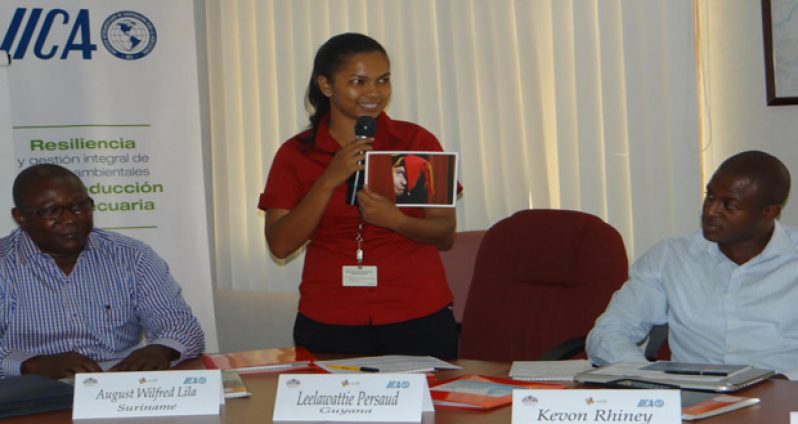GUYANA is known as “the land of many waters,” but climate change has altered that age-old status very quickly.The prevailing El Nino weather pattern can become a real arch-enemy to Guyanese farmers, and indeed farmers throughout the Caribbean Region, hence there is need for discipline to be exercised locally and regionally in the trapping and use of freshwater resources, so that severe crises can be avoided.

Climate change and its adverse effects on family farming and solutions to this dilemma were the main themes of discussion at a just concluded four-day seminar held by the Inter-American Institute for Co-operation on Agriculture (IICA) on Integrated Water Resources Management (IWRM), and adaptation of family farming to climate change.
Regional agricultural and land-use officials from Guyana and seven other Caribbean countries are involved in this seminar which ended yesterday. The training also offers them an opportunity for networking, exchanging, and sharing experiences on the way challenges facing freshwater management in the Region can be addressed.
During the opening session of the seminar on Monday, Permanent Secretary in the Ministry of Agriculture Mr George Jervis, noted that Guyana is among the top five fresh-water secure resource countries in the world per capita.
Despite this, significant portions of Guyana suffer from water stress; too much water for one-third of the year, and too little water for two-thirds of the year.
There are, he said, significant challenges either to bring water for agriculture or to remove water for agriculture.
He noted that rice cultivation is the major user, and was also the major waster, of freshwater in Guyana.
He noted: “Freshwater, provided it is there, is life…we cannot waste it. We need to have open and closed seasons for rice cultivation. We cannot decide to plant any old time and hope that someone, somewhere provides the resources to get irrigation water to us.”
He expressed hope that the workshop would enable the participants to develop a more scientific approach towards the quantity of water that Guyanese utilise for rice, with a view to determining maximum extraction values.
He said: “Notwithstanding that Guyana is ‘the land of many waters,’ we need to have some discipline in Guyana with respect to its usage in family farming and in agriculture; with regard to its conservation, particularly given the ever present threat of droughts.”
Local IICA Representative Mr Wilmot Garnett, said freshwater resources management has become an increasingly complex activity, requiring a scientific approach to better understand and develop best practices on collection, use and conservation; in finding good fresh water resource management models.
He said the 2014 – 2018 Medium Term Plan of IICA had defined water management as one of the priority issues of technical cooperation to achieve strategic objectives by 2020. These objectives were as named: (i) To improve the productivity and competitiveness of the agricultural sector; (ii) To strengthen agriculture’s contribution to the development of rural areas and the well-being of the rural population; (iii) to improve agriculture’s capacity to mitigate and adapt to climate change, and make better use of natural resources; and (iv), to improve agriculture’s contribution to food security.

He said the IWRM principles being taught would ensure that water users at all levels are involved in decision-making on the use of fresh water resources; that this important and finite resource is managed in a participatory manner.
Lead resource person at the workshop Guyanese Dr Muhammad Ibrahim, said climate change is not an abstraction nor a mere projection, but a reality. Climate change, he said, is being experienced through the water cycle – through droughts, floods, depleted rivers, shrinking reservoirs, dried-out soils, and overall shortages of water to grow food.
Dr. Ibrahim, the Guyanese Associate Director for Technical Cooperation at IICA, is based in Costa Rica. He said that at the moment, “even as we speak”, farmers within the Region are facing serious problems because of the prolonged drought brought on by the El Nino effect. This situation had given rise to the need for IICA to find ways of making family agriculture within the Region more resilient to climate change.
He said the training course was happening at a very opportune time for participants to find ways to promote more horizontal cooperation and exchange of information, so that at the end, they would have acquired techniques for better management of water in the various countries within the Region.
The beneficiaries of the training are representatives of agricultural, water management and land-use agencies in Guyana, Suriname, Jamaica, St. Lucia St. Kitts, Antigua and Barbuda, and St. Vincent and the Grenadines.
Participants were given certificates for successful participation in the programme at yesterday’s closing ceremony.
By Clifford Stanley




.jpg)









